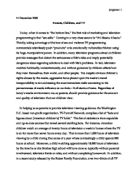Television is apart of our lives. Without moderation and discriminate adaptation of television into our lives come potential hazards, especially for children. A rising mountain of research shows that too much exposure to television can have many different negative outcomes. According to the American Academy of Pediatrics, “Too much television – particularly at ages critical for language development and manipulative play – can impinge negatively on young minds in several different ways including [. . .] lowered academic performance, especially reading scores. Moreover, the ‘two-minute mind’ easily becomes impatient with any material requiring depth of processing” (Healy). As television lures children to developing a short attention span, the content of what is on television is of equal importance.
As previously stated, some of the most prominent content of concern on TV is the two-thirds of television programs that include sexual references. Sex is the main plot device of more and more television shows. Much of the argument is that most TV shows with “sexual content” do not target (young) kids. The fact is that children of all ages watch mostly adult-oriented programs on television and, in large part, unsupervised. Furthermore, parents today tend to be overly concerned with not being cool; therefore, parents adopt a greater tolerance for crude language and sexually expressive behavior. However, per today’s consensus, sex on television is going too far. The media’s relentless emphasis on sex formulates children’s expectations and behaviors; TV shows tell children “everybody’s doing it.” In fact, teens commonly say that their top two sources of sexual pressure are television shows and music. Furthermore, during early adolescence and going through rapid emotional changes, children have less contact with adults and turn to various media, especially television, for role models. Kyla Boyse, R.N., of the University of Michigan, explains, “Young people [will] have sex because TV shows and movies make it seem more normal for their age group.” Moreover, it is common knowledge among psychologists that sex is an area of life that is laden with risk, and “most adolescents do not have well-developed risk assessment skills” (Ponton 1). Spurred-on by TV, teenagers are not only having sex earlier “but they are taking greater risks in this area” (Ponton 3). Due in large measure to the media’s influence, a ninth-grade girl reported, “Sex [. . .] is meaningless, just for fun – like going out and having a soda” (Steyer 55).
Comparably, as sex on TV is a marketable commodity, television violence also sells. Both are equally volatile television issues. Even so, the amount of journalistic fare regarding sexual content in the media is only a boulder as compared to the mountain of written material regarding violence in the media, the Mount Everest of television content controversy. After all is said and done, arguments are about non-resolute finger pointing, “spiritual emptiness,” and our natural need to exercise vicariously our innate rage. Indeed, by identifying with a violent television protagonist, comic-book creator Gerard Jones argues, “Children engage the rage they’ve stifled, come to fear it less, and become more capable of [managing] it against life’s challenges.” However, over the last thirty years more than a thousand studies by reputable medical and public health groups conclude that media violence does affect children. In fact, these extensive well-documented studies warn that unfiltered viewing of TV violence by children can have lifelong harmful effects; the more kids watch television unguided, the more likely they will fear the world around them, believe that violence is an acceptable way to deal with conflict, and become desensitized toward violence in the real world. According to education professors Nancy Carlsson-Page and Diane Levin, the overwhelming television message with its underlining of a lack of consequences is that “violence is fun, violence is exciting, violence doesn’t hurt,” and people can use violence “to solve problems with others.”
Violence on television is, in fact, a contributing factor to youth violence in our society. Notable is a report by the surgeon general’s office attesting that the number of violent acts committed by high school seniors has climbed nearly 50 percent, and arrest rates for aggravated assaults by young people have jumped nearly 70 percent since 1983. Strikingly, this is about the same time that President Reagan’s deregulation policies allowed increasingly violent programming on children’s television. Among recent reports of violence committed by children are school shootings. Thanks to impetuous television news images and sensationalism, many Americans remember the terrible 1999 high school shootings at Columbine High School in Littleton, Colorado. The reason that this tragedy is so often referenced with regard to media violence is because of the killers’ many references to movies, music, and video games in a home video they made just before they went to school that morning. The killers, Columbine seniors Eric Harris and Dylan Klebold, even discussed who would be the best director to immortalize them in a movie as they excitingly pitted against one another mogul movie directors Quentin Tarantino and Steven Spielberg, exclaiming, “[They] will be fighting over this story.”
American children used to live in a much simpler and safer television environment. When today's parents were in elementary school during the 1960’s and ‘70’s, there were three major television networks and the non-commercial Public Broadcasting Service (PBS). Computers were carefully guarded government machines that used giant reel-to-reel tape drives and filled a room the size of a movie theater. Now at the start of the 21st century, we live in a world inundated and perversely warped by a complex landscape, or mediascape, which surrounds and persistently pervades us day and night. A young child can easily spend more time in the television world than in the real one and, not surprisingly, far less time with his or her parents. As child development expert T. Berry Brazelton, M.D. warns, “[television is] the biggest competitor for our children's hearts and minds" (Steyer 4). As parents, we are careful to teach children not to talk to strangers or wander the streets by themselves. Moreover, most of us as concerned parents make sure that we know where our children are physically and with whom. Yet, we let our children wander alone, virtually unsupervised into a potentially dangerous place. In this way, we, even as concerned parents, in effect allow our children to spend three hours a day with another adult who exposes them to sex, violence, and exorbitant enticements of needing to buy needless things.
Enticing children to need things are the twenty-thousand commercials that kids watch during the course of a year. Many of these commercials target KIDS: Keepers of Infinite DollarS – the way that corporate America views children. With working parents in mind, media conglomerates armed with research results, marketing strategists, and “cool hunters” target children in their respective age groups. In the conference room, these marketing professionals conjure up merchandise, commercials, and TV shows as part of a gigantic marketing scheme where, aiming at the bull’s-eye of big profits, child marketers often use crafty terms such as “the gimme factor,” “pester power,” and “shut-up toys.” As Kathryn Montgomery, head of the Center for Media Education, observes, “Saturday morning television is nothing more than program-length toy advertisements.” As children get older, television commercial messages and luring images create a youth culture where, increasingly, defining values are in materialistic terms. Furthermore, these commercial messages profoundly influence children about what their body image and sexual roles should be. In short, “stay tuned for your regular scheduled programming” . . . of you.
Sex, violence, incessant commercial advertising, media corporate irresponsibility and government’s regulatory impotence, this is today’s television reality. However, the TV is right there, right now, in our family rooms, kitchens, and bedrooms calling for its regular staring-at session. Although we as parents may reasonably feel overwhelmed and undermined by the influence of television upon our children, the bottom line for us comes down to taking whatever steps we can to control television’s impact on our children. In practical terms for parents in today’s real world, these steps primarily are realistic levels of awareness and involvement with our children’s television “activities.” For reference, a vast wealth of information based on research from organizations exist, such as the American Academy of Pediatrics and their “Smart Guide to Kid’s TV” (Chen), that list many suggestions for our involvement as parents with our children’s television activities. Key recommendations include the following:
- Parents should set limits of TV viewing (for the entire family).
- Parents should preview and understand the content of the TV shows watched by their kids.
- Parents should actively participate by watching programs with their children, observing their reactions and answering questions children ask.
- Parents can stimulate children’s critical thinking development by asking their children to express their ideas and opinions about what they are watching on TV.
Furthermore, a recently developed program called “media literacy” is available to the public where essentially we as parents can work with teachers specifically to help our children to analyze, evaluate, and critically process the television our children watch.
This may not be easy, but who ever said parenting was easy? In this world of lurid media, parents’ guiding their children within the TV world from the real world is the first line of defense for kids and their developmental health. Furthermore, even as most TV is designed purely as market-minded entertainment, including sports, cartoons, and commercials, committing to our responsibility as parents in sharing television with our children may provide a springboard for learning as well as lead to positive family experiences. At the very least, child-development expert T. Barry Brazelton advises, “[The] bottom line is that you should share [television] experiences with your kids and be ready to talk with them about what they are experiencing. That’s the best thing a parent can do” (Steyer 197).
Works Cited
Boyse, Kyla. "Your Child: Development & Behavior Resources: Television." UMHS.
2002. University of Michigan. 30 Nov 2003.
<http://www.med.umich.edu/1libr/yourchild/tv.htm>.
Carlsson-Paige, Nancy. Levin, Diane. "Stop Marketing Violence to Tots.". 1999. Young
Media. 30 Nov 2003. <http://www.youngmedia.org.au/yma/Subpages/violence.htm>.
Chen, Milton. "Smart Guide to Kid's TV.". 2003. American Academy of Pediatrics.
30 Nov 2003. <http://www.aap.org/family/smarttv.htm>.
"Children, Violence, and the Media A Report for Parents and Policy Makers.”. 1999.
Senate Committee on the Judiciary. 30 Nov 2003. <http://judiciary.senate.gov/oldsite/mediavio.htm>.
"Facts and Figures about our TV Habit." Real Vision. 2000. TV Turnoff Network.
30 Nov 2003.
<>.
Healy, Jane. "Understanding TV's effects on the developing brain." AAP News 1998.
30 Nov 2003. <http://www.aap.org/advocacy/chm98nws.htm>.
Jones, Gerard. "Violent Media is Good for Kids." . 2000. The Foundation for National
Progress. 30 Nov 2003.
<http://www.motherjones.com/commentary/columns/2000/06/violent_media
.html>.
Montgomery, Kathryn. "How the Power Rangers Stole Xmas." Ladies Home Journal
1995:p.126
Moore, Michael. Adventures in a TV Nation. New York: Harper Perennial, 1998.
Ponton, Lynn. The Sex Lives of Teenagers. New York: Dutton, 2000.
"Sex on TV: Content and Context: A Biennial Report." . 1999. Kaiser Family Foundation.
30 Nov 2003. <http://www.kff.org/entmedia/1457-sex.cfm>.
Shawcross, William. "Rupert Murdoch." Time Online Edition 1999. 30 Nov 2003.
<http://www.time.com/time/magazine/intl/article/0,9171,1107991025-33716,00.html>.
Steyer, James P. The Other Parent: The Inside Story of the Media’s Effect on Our
Children. New York, Atria Books; 2002.
"Tragedy in Colorado: Columbine gunmen hoped for immortality." USA Today 1999.
30 Nov 2003. <http://www.usatoday.com/news/index/colo/colo183.htm>.
"Youth Violence: A Report of the Surgeon General." . 2001. U.S. Public Health Service.
30 Nov 2003. <http://www.surgeongeneral.gov/library/youthviolence/>.
Michael Moore’s 2002 film, Bowling in Columbine, won the Academy of Motion Picture Arts and Sciences award for Best Documentary.
Quentin Tarantino and Steven Spielberg are acclaimed Hollywood movie directors. Tarantino directed the 1994 blockbuster hit Pulp Fiction. Spielberg has renowned fame for directing several films including Jaws (1975), Poltergeist (1982), and Jurassic Park (1993).







